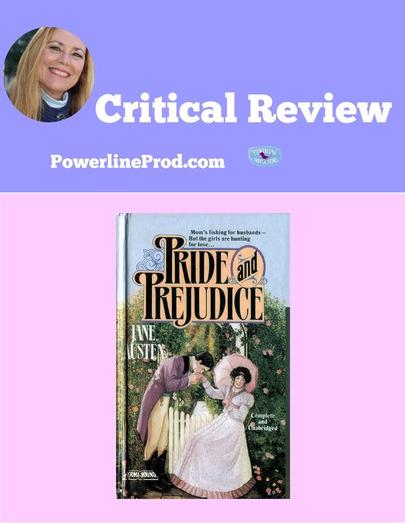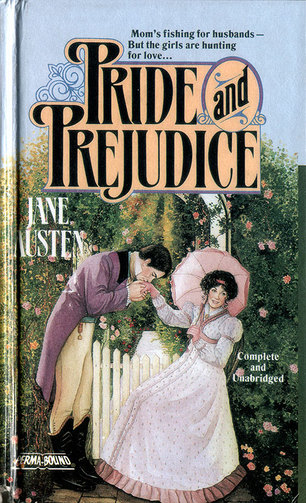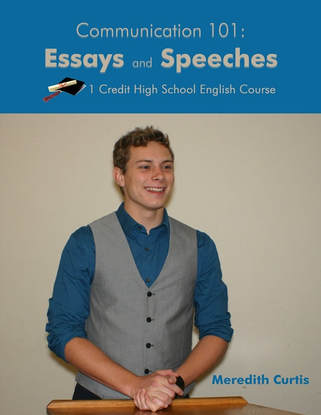 The theme of true love in Jane Austen’s Pride and Prejudice goes beyond the mere fairy tale happily ever after. The author truly believes that people can overcome their moral failings to see others as valuable. In Miss Austen’s time not all people were Christians, but a Christian worldview dominated the culture, giving clear moral guideposts. Though her novel is set in a society with diverse social classes and prescribed ways of living that are quite unlike our culture today, her message is one as old as time. Life comes down to interactions between individuals who make the choice to see one another as valuable because they are created in the image of One True God or to be filled with pride, seeing themselves as superior. The author believes that true love can blossom when moral failings are dealt a death blow. Jane Austen takes us back in time to Georgian England where life is slower, manners matter, and people know their place in society. Like today, young people are looking for a spouse and parents are eager to be right in the middle of the courting and wooing. In this delightful tale, we meet Elizabeth Bennett and the wealthy Mr. Darcy. Mr. Darcy views himself superior to Elizabeth and her family, but against his will, he is attracted to her. Elizabeth finds Mr. Darcy smug and prideful. Rank or birth does not negate a person’s worth. As a pastor’s daughter, Jane Austen places high value on personal accountability for one’s actions, especially how people treat other people. Bad behavior is bad behavior whether it is performed by Elizabeth’s own mother being indiscreet or Mr. Darcy refusing to dance with the ladies who are not attractive enough to arouse his interest. Both display selfishness.  Though Mr. Darcy is much wealthier than Elizabeth Bennett, they both belong to the nobility with titles and land. Yes, there is still class difference and inequality of wealth, but the main barrier to their friendship is their own stubborn pride and prejudice. Both Mr. Darcy and Elizabeth Bennett look at what they see on the surface and make assumptions. Mr. Darcy assumes that Jane does not have genuine feelings for his friend Bingley and Elizabeth assumes that Mr. Darcy hates Wickham without reason. Both are genuinely wrong in their beliefs, creating prejudice that stirs up even more problems in the future. Miss Austen does not preach at us or force her ideals down our throat. As a master storyteller, she is able to weave events and conversations skillfully to draw us into a world of people whose lives are intertwined. We like Wickham, along with Elizabeth when we meet him. We are horrified when we learn the truth and chide ourselves for falling for his charm. We are so disappointed when Jane is in London and Bingley never calls on her. We are confused, thinking that he liked her so much and wondering what happened. When we learn that Mr. Darcy never told him that Jane was in London, we are angry at Mr. Darcy. We are caught up in the drama. We learn later that Mr. Darcy’s own father invested in a servant’s son and treated this young man as his own, but the young man rejected the love of the family and took advantage of Mr. Darcy’s sister. Not only did this anger Mr. Darcy, but he felt too humiliated to make Wickham’s bad character known so his bad behavior continued to harm other innocent young girls. Suddenly, Mr. Darcy is humanized for us and we see him in a different light as someone who has been hurt and rejected. We learn positive things about him from others who know him more intimately such as servants and his beloved sister. Our emotions toward Mr. Darcy are changing along with Elizabeth’s feelings. As Elizabeth and Mr. Darcy begin to see that there is more in one another than meets the eye, they repent of their pride and prejudice and their feelings change from attraction to genuine love. This love shows itself when Mr. Darcy tracks down Mr. Wickham and forces him to marry Elizabeth’s sister, whom he has taken advantage of. The old Mr. Darcy would have pushed himself away from scandal, but the new Mr. Darcy rushes into the rescue. Something that I appreciate about the story is that love based on attraction is rejected and true love blossoms after there is repentance from pride and prejudice, as well as genuine examples of Mr. Darcy and Elizabeth serving one another and expecting nothing in return. Far more than a romantic tale, this story serves as a reminder that while manners and outer appearance are delightful, it is the character inside that determines our ability to love and be loved. In addition, when pride and prejudice are set aside, true love can bloom and grow.  This essay can be found in Communication 101: Essays & Speeches, a one-credit high school English course from Powerline Productions. In Communication 101: Speeches and Essays, students read classic essays from gifted authors including C.S. Lewis, G.K. Chesterton, Francis Bacon, William F. Buckley, Charles Lamb, and Jonathan Swift. Students write the following essays: descriptive, narrative, comparison, persuasive, article, and a letter to the editor. There are also several timed essay assignments to help teens feel comfortable with timed essays. Students listen to skilled speakers on YouTube such as Ronald Reagan, Winston Churchill, Martin Luther King, Maggie Thatcher, John F. Kennedy, General Douglas MacArthur, and Ken Ham, as well as movie clips of great speeches. Teens will give the following speeches: read a children's book aloud, introductory speech, demonstration, persuasive, testimony, interview, commercial, and extemporaneous. At the end of the year, they have a simple introduction to debate. You can purchase Communication 101 at Amazon. The E-book is available at PayHip and Currclick. God bless you! Meredith Curtis
0 Comments
Leave a Reply. |
AuthorsMeredith Curtis Archives
February 2020
Categories
All
|
Powerline Productions
- Home
-
Books
-
Curriculum
- HIS Story of the 20th Century >
-
High School Courses
>
- Economics, Finances, & Business >
- American Literature & Research
- British Literature
- Who-Dun-It Murder Mystery
- Foundations of Western Literature
- Communication 101: Essays & Speeches
- Old Testament Survey
- Worldview: Understand the Times Workbook
- Drama
- Career Choices & the College Decision
- Real Men 101
- Real Men 102
- Real Men 103: Leadership
- God's Girls 101
- God's Girls 103
- God's Girls 104: Motherhood
- God's Girls 105: Homemaking
- Travel God's World Geography >
- Government
- Unit Studies >
- Teach History the Fun Way >
- Families Learn Together American History >
- STEM Notebooking Pages
- Middle School Courses >
-
Bible
- Cozy Mysteries
- Blog
Photos from cloudzilla, Fil.Al, vaniljapulla, m01229, Ian D. Keating, (Imagine) 2.0, Theo Crazzolara, RomitaGirl67, RomitaGirl67, Gonmi, moonlightbulb, RomitaGirl67, Amydeanne, Salva Martinez, Graham Ó Síodhacháin, Ruth and Dave, infomatique, MsSaraKelly, moonrat42, {Guerrilla Futures | Jason Tester}, Monica's Dad, kennethkonica, o palsson, Tourismusregion Katschberg, wuestenigel, COD Newsroom, ANBerlin, Henri Photography, Tourismusregion Katschberg, Corey Ann, *_*, diannlroy.com, Theo Crazzolara, DaPuglet, terren in Virginia, George M. Groutas, Bunches and Bits {Karina}, Anders Ruff Custom Designs, ¥§•ªˆ¨ˇ© LOVE © ˇ¨ˆª•§¥, srqpix, inkknife_2000 (8 million views +), judy dean, ANBerlin, Phil Roeder, Base Camp Baker, Anders Ruff Custom Designs
 RSS Feed
RSS Feed







